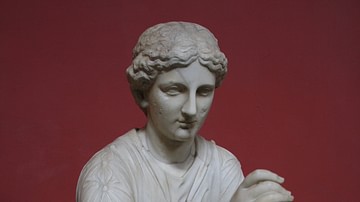
Homer (c. 750 BCE) is perhaps the greatest of all epic poets and his legendary status was well established by the time of Classical Athens. He composed (not wrote, since the poems were created and transmitted orally, they were not written down until much later) two major works, the Iliad and the Odyssey; other works were attributed to Homer, but even in antiquity their authorship was disputed. In conjunction with Hesiod, Homer acts as a great pool of information for the Greeks about their gods. Homer is the earliest poet in Western culture whose works have survived intact.
The Iliad
The Iliad is composed of 15,693 hexameters (lines of verse), and is divided into 24 books corresponding to each letter of the Greek alphabet - alpha to omega, a system that was already in place by the time of Herodotus. The Iliad traces the anger of Achilles (“Sing Muse, of the wrath of Achilles” Iliad.1.1) and takes place over 51 days during the tenth and final year of the Trojan War. The poem takes its name from the city of Troy, which is also known as Ilium.
Priam to Achilles
Highlights include: the lengthy Catalogue of Ships of the Greek invading forces, the death of Patroclus and the description of him being carried away by the twins Hypnos and Thanatos (Sleep and Death), the description of the shield of Achilles, the reconciliation between Achilles and Priam, perhaps one of the most moving scenes in Western literature, and several set-piece battles between pairs of Greek heroes, most famously the fight between Achilles and Hektor. In all of these events the intervention of the Greek gods, especially Athena on the side of the Greeks and Apollo for the Trojans, is instrumental in the outcome of all of the human actions during the war.

The Odyssey
The Odyssey is composed of 12,109 hexameters and is also divided into 24 in the same manner as the Iliad. Whereas war and anger were the themes of the Iliad, the Odyssey takes place after the Trojan War has been won by the Achaeans, as the Greeks are referred to by Homer. The Odyssey is concerned with the nostos (journey) of the Greek hero Odysseus (the protagonist after whom the poem is named) and the troubles that he faces on his way home from Troy, foiled on his way by godly interventions, especially those of Poseidon. Highlights include Odysseus' famous encounters with the Sirens, with the Cyclops Polyphemus, and the slaying of his wife Penelope's suitors upon his return to Ithaca.
Odysseus on blinding the Cyclops
Unlike Hesiod, who mentions his family and life within his works, this is not really the case for Homer, and since writing is generally believed to have started around 700 BCE, there is no contemporary source on him either, but there are various later Hellenistic and even Roman descriptions of his life (and also the Contest of Homer and Hesiod). Because the dialect of Homer's works is composed in an archaic form of Ionian Greek and he displays a familiarity with the geography of Asia Minor in the Iliad, there could be some element of truth to claims that Homer's birthplace was Smyrna, Chios, or Ios.
A Single Homer?
There have always been debates as to the 'person' of Homer: many places claim to be his birthplace. It is even debated whether or not the two great works were written by the same person: the ancients called those who thought this the chorizontes; the separatists. Some even doubt if one single person was behind these works, and that leads to 'the Homeric Question', the idea that the poems are a compilation of layers rolled into one story, which could explain inconsistencies in the narrative and the formulaic language used. According to this school of thought, the poems would most likely have been sung episodically by rhapsodes. This idea was first argued by F. A. Wolf in his 1795 CE work Prolegomena ad Homerum.
Nevertheless, whether Homer was a 'she', a 'he', or a 'they' does not diminish the greatness of the Iliad and the Odyssey, and this can be seen by the fact that the two poems have come down to us in a continuous tradition. The poems were first compiled, organised, and edited under the Athenian Peisistratus, but the Greek text that we have survives from such Alexandrian scholars as Zenodotus and Aristophanes of Byzantium and Aristarchus and their comments on the texts. The first printed editions of Homer were in 1488 CE in Florence by Chalcondyles of Athens. Homer's work was hugely influential on Greek culture, and scenes from his works appeared in Greek sculpture, on Greek pottery, and in Greek tragedy and comedy. He was studied as part of Greek education, and the legends within his work would influence Hellenistic culture, Roman culture, and far beyond, so that Homer's lasting legacy is that his works are still studied to this day.







